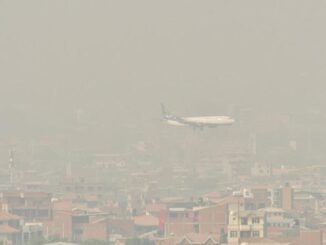
LOS ANGELES – Firefighters finally started gaining control over two major wildfires on the eastern and western flanks of Los Angeles on Friday as fierce winds that supercharged the fires for days finally eased.
Six simultaneous wildfires have devastated Los Angeles County neighborhoods since Tuesday, have killed at least 10 people over and destroyed nearly 10,000 structures. Those totals are expected to grow.
With thousands of people suddenly homeless and the thickening smoke leading U.S. officials to declare a public health emergency, firefighters reported progress arresting the Palisades Fire on the western edge of the city and the Eaton Fire in the foothills east of the sprawling metropolis.
After burning out of control for days, despite the efforts of hundreds of firefighter attacking the blazes from the air and on the ground, the Palisades Fire was 8% contained and the Eaton Fire 3%. Cal Fire said both containment levels had been 0% until Friday.
Even so, the fires combined had consumed more than 34,000 acres (13,700 hectares) – or 53 square miles (137 sq km), 2-1/2 times the land area of Manhattan.
“We are doing everything we can to bring the situation under control, and success has been reported,” Los Angeles Mayor Karen Bass said at a news conference. “We know that we’re going to have a possible increase in the force of the winds at the beginning of next week, and getting Los Angeles prepared – doing everything we can to save lives – that is our No. 1 job.”
Conditions in the Los Angeles area will improve through the weekend, with sustained winds slowing to about 20 mph (32 kph), gusting between 35 mph and 50 mph, according to the National Weather Service, a respite from recent wind gusts of 80 mph.
Any easing would allow more crucial support from aircraft dropping water and fire retardant on the flaming hills.
“It’s not as gusty, so that should help firefighters,” NWS meteorologist Allison Santorelli said, adding that conditions were still critical with low humidity and dry vegetation.
Farther south in San Diego, winds will pick up, with sustained winds of 40 mph and gusts up to 70 mph, creating dangerous fire there conditions over the weekend, she added.
‘No words’
Pacific Palisades residents who ventured back to their devastated neighborhoods were shocked to find brick chimneys looming over charred waste and burnt-out vehicles as acrid smoke lingered in the air.
“I can’t describe it,” 44-year-old psychiatrist Kelly Foster said as she combed through the ashy rubble where her home once stood. “I have no words.”
Officials have imposed a curfew in mandatory evacuation zones for the Palisades and Eaton Fires to prevent looting. California National Guard members also have begun to arrive to free up firefighters and police.
On Friday morning, hundreds of people streamed into a parking lot near the Rose Bowl stadium in Pasadena for donated clothing, diapers and bottled water. Eventually police forced the makeshift aid center, set up near the epicenter of the Eaton Fire, to make way for the growing number of first responders staged nearby.
Denise Doss, 63, said authorities earlier had stopped her from checking on the nearby Altadena home she shares with her 86-year-old father, citing risks of burning embers and potentially ruptured gas lines.
Another Altadena resident picking up supplies, 78-year-old Everett Wilson, said his home escaped the flames but he worries about looters: “I just don’t want someone to take my stuff.”
Meanwhile, false evacuation messages sent by an automated alert system further frayed the nerves of Angelenos. Officials vowed to fix the problem.
Tens of thousands of area homes also were without power, and air quality is a major concern.
Billions in losses
Many Altadena residents said they were worried government resources would go to wealthier areas and that insurers might short-change those who cannot afford to contest denials of fire claims.
Catastrophic losses are already weighing on insurers, which are bracing for billions of dollars in potential claims.
Private forecaster AccuWeather estimated the damage and economic loss at $135 billion to $150 billion, portending an arduous recovery and soaring homeowners’ insurance costs.
California Insurance Commissioner Ricardo Lara called on insurers on Friday to suspend pending non-renewals and cancellations that homeowners received before the fires began and to extend the grace period for payments.
Biden has declared the fires a major disaster and said the U.S. government would reimburse 100% of the recovery for the next six months. In a call with Mayor Bass and California Governor Gavin Newsom on Friday he reiterated his pledge to provide California with resources to fight the blazes and rebuild.
On Jan. 20, the Democratic president hands over the reins of government to his successor, Republican Donald Trump. The president-elect, along with his allies, has sought to blame Democratic state and local officials as well and environmentalists for the Los Angeles disaster, which scientists say is the latest in weather extremes triggered by climate change.
Bone-dry conditions meet Santa Ana winds
The fires erupted across Los Angeles after months without rain and the arrival this week of fierce Santa Ana winds blowing hot, dry air over the region outside the traditional fire season.
City and fire officials have said water hydrants in the urban area were not designed to handle such a massive, unprecedented wildfire.
Officials are still investigating what ignited the blazes, as flames continued to raze homes and landmarks while evacuations, closures and sports relocations continued.
Los Angeles police interviewed a possible arson suspect related to the Kenneth Fire near Calabasas but lacked enough probable cause for an arrest on that charge, Assistant Police Chief Dominic Choi told reporters on Friday.
Edison International EIX.N unit Southern California Edison said insurers asked it to preserve evidence related to the Eaton Fire but that no fire agencies have connected the utility to the blaze. —Reuters





Be the first to comment